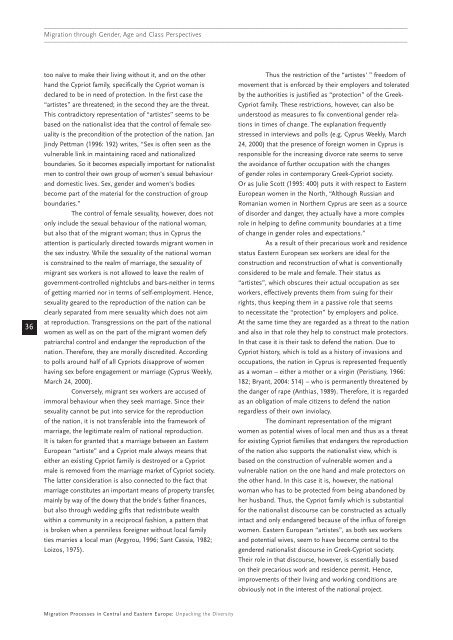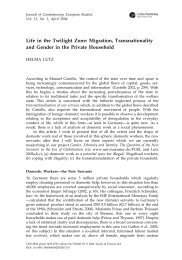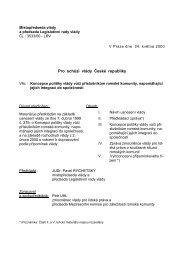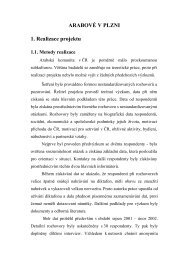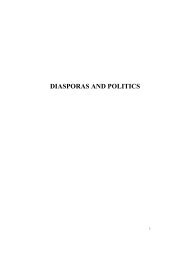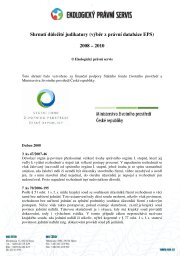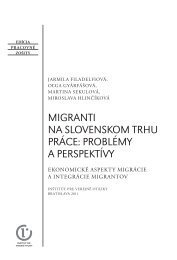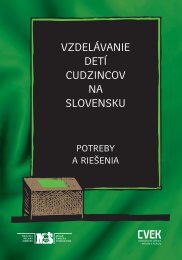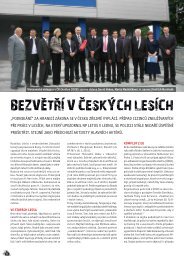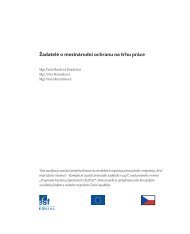Migration Processes in Central and Eastern Europe - Multiple Choices
Migration Processes in Central and Eastern Europe - Multiple Choices
Migration Processes in Central and Eastern Europe - Multiple Choices
You also want an ePaper? Increase the reach of your titles
YUMPU automatically turns print PDFs into web optimized ePapers that Google loves.
———————————————————————————————————————————————————————————————<br />
<strong>Migration</strong> through Gender, Age <strong>and</strong> Class Perspectives<br />
———————————————————————————————————————————————————————————————<br />
36<br />
too nal .. ve to make their liv<strong>in</strong>g without it, <strong>and</strong> on the other<br />
h<strong>and</strong> the Cypriot family, specifically the Cypriot woman is<br />
declared to be <strong>in</strong> need of protection. In the first case the<br />
“artistes” are threatened; <strong>in</strong> the second they are the threat.<br />
This contradictory representation of “artistes” seems to be<br />
based on the nationalist idea that the control of female sexuality<br />
is the precondition of the protection of the nation. Jan<br />
J<strong>in</strong>dy Pettman (1996: 192) writes, “Sex is often seen as the<br />
vulnerable l<strong>in</strong>k <strong>in</strong> ma<strong>in</strong>ta<strong>in</strong><strong>in</strong>g raced <strong>and</strong> nationalized<br />
boundaries. So it becomes especially important for nationalist<br />
men to control their own group of women's sexual behaviour<br />
<strong>and</strong> domestic lives. Sex, gender <strong>and</strong> women's bodies<br />
become part of the material for the construction of group<br />
boundaries.”<br />
The control of female sexuality, however, does not<br />
only <strong>in</strong>clude the sexual behaviour of the national woman,<br />
but also that of the migrant woman; thus <strong>in</strong> Cyprus the<br />
attention is particularly directed towards migrant women <strong>in</strong><br />
the sex <strong>in</strong>dustry. While the sexuality of the national woman<br />
is constra<strong>in</strong>ed to the realm of marriage, the sexuality of<br />
migrant sex workers is not allowed to leave the realm of<br />
government-controlled nightclubs <strong>and</strong> bars-neither <strong>in</strong> terms<br />
of gett<strong>in</strong>g married nor <strong>in</strong> terms of self-employment. Hence,<br />
sexuality geared to the reproduction of the nation can be<br />
clearly separated from mere sexuality which does not aim<br />
at reproduction. Transgressions on the part of the national<br />
women as well as on the part of the migrant women defy<br />
patriarchal control <strong>and</strong> endanger the reproduction of the<br />
nation. Therefore, they are morally discredited. Accord<strong>in</strong>g<br />
to polls around half of all Cypriots disapprove of women<br />
hav<strong>in</strong>g sex before engagement or marriage (Cyprus Weekly,<br />
March 24, 2000).<br />
Conversely, migrant sex workers are accused of<br />
immoral behaviour when they seek marriage. S<strong>in</strong>ce their<br />
sexuality cannot be put <strong>in</strong>to service for the reproduction<br />
of the nation, it is not transferable <strong>in</strong>to the framework of<br />
marriage, the legitimate realm of national reproduction.<br />
It is taken for granted that a marriage between an <strong>Eastern</strong><br />
<strong>Europe</strong>an “artiste” <strong>and</strong> a Cypriot male always means that<br />
either an exist<strong>in</strong>g Cypriot family is destroyed or a Cypriot<br />
male is removed from the marriage market of Cypriot society.<br />
The latter consideration is also connected to the fact that<br />
marriage constitutes an important means of property transfer,<br />
ma<strong>in</strong>ly by way of the dowry that the bride's father f<strong>in</strong>ances,<br />
but also through wedd<strong>in</strong>g gifts that redistribute wealth<br />
with<strong>in</strong> a community <strong>in</strong> a reciprocal fashion, a pattern that<br />
is broken when a penniless foreigner without local family<br />
ties marries a local man (Argyrou, 1996; Sant Cassia, 1982;<br />
Loizos, 1975).<br />
Thus the restriction of the “artistes' ” freedom of<br />
movement that is enforced by their employers <strong>and</strong> tolerated<br />
by the authorities is justified as “protection” of the Greek-<br />
Cypriot family. These restrictions, however, can also be<br />
understood as measures to fix conventional gender relations<br />
<strong>in</strong> times of change. The explanation frequently<br />
stressed <strong>in</strong> <strong>in</strong>terviews <strong>and</strong> polls (e.g. Cyprus Weekly, March<br />
24, 2000) that the presence of foreign women <strong>in</strong> Cyprus is<br />
responsible for the <strong>in</strong>creas<strong>in</strong>g divorce rate seems to serve<br />
the avoidance of further occupation with the changes<br />
of gender roles <strong>in</strong> contemporary Greek-Cypriot society.<br />
Or as Julie Scott (1995: 400) puts it with respect to <strong>Eastern</strong><br />
<strong>Europe</strong>an women <strong>in</strong> the North, “Although Russian <strong>and</strong><br />
Romanian women <strong>in</strong> Northern Cyprus are seen as a source<br />
of disorder <strong>and</strong> danger, they actually have a more complex<br />
role <strong>in</strong> help<strong>in</strong>g to def<strong>in</strong>e community boundaries at a time<br />
of change <strong>in</strong> gender roles <strong>and</strong> expectations.”<br />
As a result of their precarious work <strong>and</strong> residence<br />
status <strong>Eastern</strong> <strong>Europe</strong>an sex workers are ideal for the<br />
construction <strong>and</strong> reconstruction of what is conventionally<br />
considered to be male <strong>and</strong> female. Their status as<br />
“artistes”, which obscures their actual occupation as sex<br />
workers, effectively prevents them from su<strong>in</strong>g for their<br />
rights, thus keep<strong>in</strong>g them <strong>in</strong> a passive role that seems<br />
to necessitate the “protection” by employers <strong>and</strong> police.<br />
At the same time they are regarded as a threat to the nation<br />
<strong>and</strong> also <strong>in</strong> that role they help to construct male protectors.<br />
In that case it is their task to defend the nation. Due to<br />
Cypriot history, which is told as a history of <strong>in</strong>vasions <strong>and</strong><br />
occupations, the nation <strong>in</strong> Cyprus is represented frequently<br />
as a woman – either a mother or a virg<strong>in</strong> (Peristiany, 1966:<br />
182; Bryant, 2004: 514) – who is permanently threatened by<br />
the danger of rape (Anthias, 1989). Therefore, it is regarded<br />
as an obligation of male citizens to defend the nation<br />
regardless of their own <strong>in</strong>violacy.<br />
The dom<strong>in</strong>ant representation of the migrant<br />
women as potential wives of local men <strong>and</strong> thus as a threat<br />
for exist<strong>in</strong>g Cypriot families that endangers the reproduction<br />
of the nation also supports the nationalist view, which is<br />
based on the construction of vulnerable women <strong>and</strong> a<br />
vulnerable nation on the one h<strong>and</strong> <strong>and</strong> male protectors on<br />
the other h<strong>and</strong>. In this case it is, however, the national<br />
woman who has to be protected from be<strong>in</strong>g ab<strong>and</strong>oned by<br />
her husb<strong>and</strong>. Thus, the Cypriot family which is substantial<br />
for the nationalist discourse can be constructed as actually<br />
<strong>in</strong>tact <strong>and</strong> only endangered because of the <strong>in</strong>flux of foreign<br />
women. <strong>Eastern</strong> <strong>Europe</strong>an “artistes”, as both sex workers<br />
<strong>and</strong> potential wives, seem to have become central to the<br />
gendered nationalist discourse <strong>in</strong> Greek-Cypriot society.<br />
Their role <strong>in</strong> that discourse, however, is essentially based<br />
on their precarious work <strong>and</strong> residence permit. Hence,<br />
improvements of their liv<strong>in</strong>g <strong>and</strong> work<strong>in</strong>g conditions are<br />
obviously not <strong>in</strong> the <strong>in</strong>terest of the national project.<br />
<strong>Migration</strong> <strong>Processes</strong> <strong>in</strong> <strong>Central</strong> <strong>and</strong> <strong>Eastern</strong> <strong>Europe</strong>: Unpack<strong>in</strong>g the Diversity


